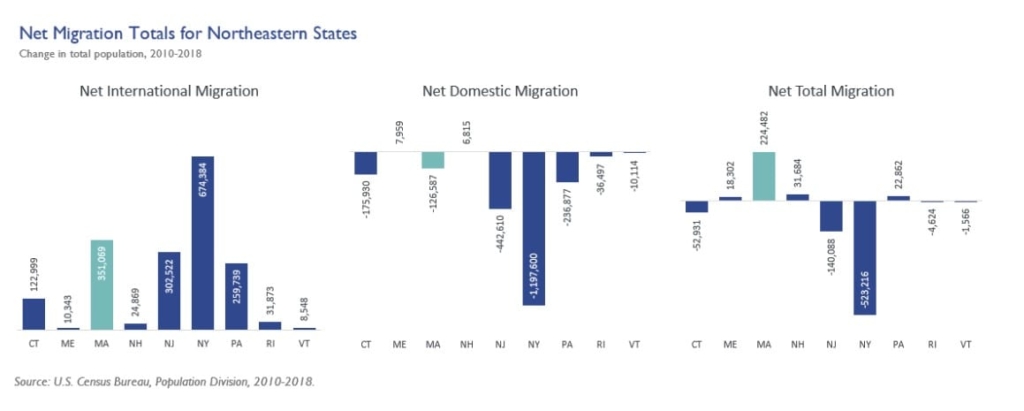
AS DEBATE OVER immigration continues to roil the national political waters, a new study highlights the crucial role newcomers to the US play in the Massachusetts economy and population growth.
If it were not for international migration, the state would have lost population from 2010 to 2018, according to a report issued by The Boston Foundation. The state experienced net outmigration of 126,587 US residents over that period, but it was more than offset by a net gain of 351,069 immigrants.
The Northeast lost more residents than any other region, but Massachusetts experienced a 3 percent gain in population because the increases from international migration outpaced losses from domestic migration. The population growth was the largest of any Northeast state.
The report, issued by the foundation’s Boston Indicators project, is based on data released in December by the Census Bureau’s Population Estimates program.
“One way to think about this is the interesting push and pull happening in Massachusetts,” said Luc Schuster, the project’s director. “We’re a thriving economy attracting highly skilled workers, like the H-1B visa folks and international students at our universities.” Meanwhile, job transfers or new positions out of state and housing-related concerns were driving domestic outmigration that saw residents leave the state, according to the report.

While the majority of Northeastern states lost population between 2010 and 2018, Massachusetts experienced a 3 percent increase in population.
It’s not the first time a study has pointed to the crucial role of immigration in fueling population growth in the state. A 2005 MassINC research report came to a similar conclusion, showing that from 2000 to 2004, the state’s population and labor force would both have declined without the arrival of new immigrants.
“Talking to my international friends, the thing that drew us to Boston in particular is how diverse the population is,” said Mokgabo Maruping, 23, an accounting and finance student at Northeastern University and native of Botswana. “None of us wanted to stick out like a sore thumb, and we also wanted to meet a lot of people from across the world. Northeastern and Boston is a great place for that.”
Maruping said she picked Northeastern for its co-op program, but also for Boston’s proximity to accounting and finance firms in the area.
Besides college students, international workers are filling specialty jobs in Massachusetts, usually in computer science and engineering, through the H-1B visa program. Data from the Department of Labor show that in 2018, more than 47,700 labor certifications were provided to foreign workers with H-1B visas in the state. The certifications allow a worker to stay in the US for up to three years with a potential extension for a total of six years.
Mark Melnik, director of economic and public policy research at the University of Massachusetts Donahue Institute, said international migration to Massachusetts is made up of newcomers with very high and very low levels of education.
“We have 20 to 25 percent with low levels of education, but also have a percentage with a high degree of education in our state,” Melnik said of the immigrant mix. He pointed to the state’s robust “eds and meds” economy — the high density of universities, biotech, and medical institutions — which employs both highly educated workers and those with less education who fill support positions like environmental services and food services.
Melnik said that as the baby boomer population ages and retires, there is growing concern over how the next generation, which is significantly smaller, will fill the labor force positions being left behind. “This is one of the red flags we need to worry about in the Massachusetts economy,” he said.
Foreign-born labor accounts for nearly 80 percent of the labor force growth in the state since 1990, according to the Donahue Institute.
The state’s immigrant population impacts more than labor and economy. It also has implications for congressional representation and federal funding.
Secretary of State William Galvin has raised concern that a Trump administration proposal to include a question on citizenship on the 2020 Census will discourage immigrants from participating. “The population numbers make it clear that Massachusetts should retain all of our congressional representation, as long as we have a fair and accurate count,” Galvin said in December. “I will continue to pursue all legal options to prevent the current administration from inserting questions about citizenship status into the 2020 Census, in their effort to shortchange states like ours by dissuading our immigrant population from being counted.”
Despite an increase in the state’s population to almost 7 million residents since the last Census, an undercount in the 2020 Census could lead to the loss of congressional representation, electoral votes, and federal resources. Massachusetts lost a congressional seat and electoral vote after the 2010 Census.
The post Without immigrants, Mass. would lose population, study says appeared first on CommonWealth Magazine.